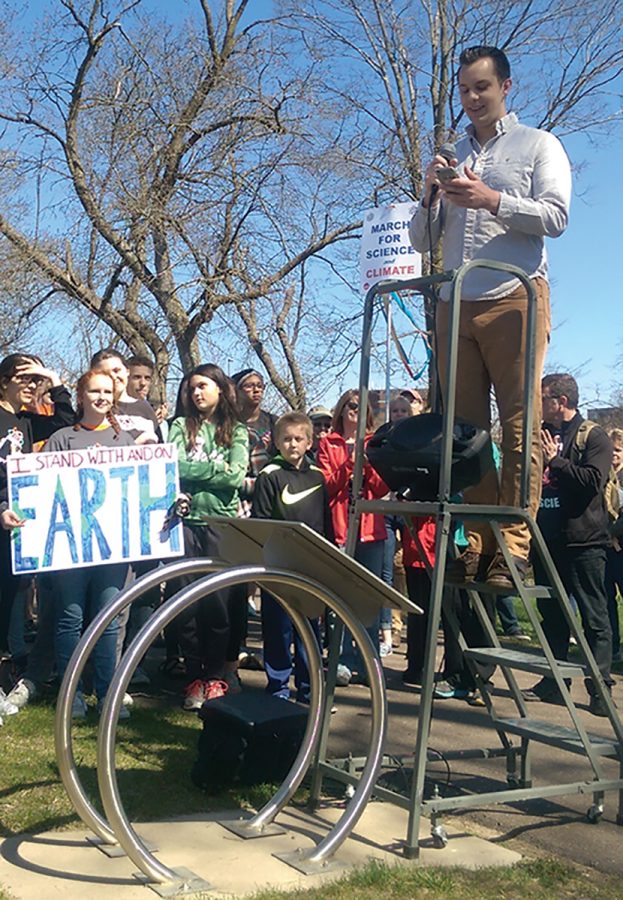Eau Claire community joins 600 marches across the nation dedicated to science
March for Science recognizes Eau Claire’s choices in city planning among other subjects
More stories from Elizabeth Gosling
Photo by Elizabeth Gosling
The Eau Claire Science March welcomed eight speakers throughout the route, one of them being Ethan Fuhrman, Student Office of Sustainability Director. The march started on the campus mall and finished at Phoenix Park.
To celebrate Earth Day in Eau Claire, nearly 300 people came together at 10 a.m. Saturday, in an effort to advocate for the scientific community in Eau Claire. A sister march of the March for Science, Eau Claire was among 600 other marches across the country.
The March for Science, an event started this year, aims to defend science’s role in society in all realms, including land, health, economy and government.
The march began on the UW-Eau Claire campus mall, the public, equipped with signs, flags, friends and families all united to celebrate the Earth and the contributions scientists make to strengthen the world’s communities.
Jim Boulter, director of the Watershed Institute, helped coordinate the event and was one of the first speakers to kick off the festivities.
“Today, I march as a scientist, a researcher and an educator,” Boulter said. “I march as an active citizen, a person of faith and a fellow human being in community with my fellow residents of Planet Earth, both human and non-human. I march today for science that serves the common good.”
The non-partisan march emphasized the importance of scientific policies and behaviors within our society. Boulter said scientists and the scientific community must improve their communication with the people and the government. More importantly, he said, they must reject those who deny science and scientific knowledge.
Other speakers along the route included Paul Thomas, professor of physics and astronomy; Ethan Fuhrman, student office of sustainability director; Celeste Snyder, community member; Dr. Doug Faulkner, professor of geography and anthropology; Winnifred “Fred” Bryant, associate professor of biology; Dr. Karen Mumford, associate professor in the Watershed Institute and Kerry Kincaid, city council president.
Each speaker addressed a different aspect of science and the role it plays in their life. Kincaid, president of the city council, told her story of working as a registered nurse, helping people and using science to make informed choices. Later, she pursued political science and is now working as a public servant.
She shared the creation story of Phoenix Park, an Eau Claire landmark built on the former site of industrial and manufacturing businesses, and how the city had to consider science and the environment in designing the park.
Fuhrman dedicated his march to the impacts environmental public health has on climate change.
“Climate change seems to incorporate all of the social, environmental and economic issues facing civilization today. Rhetorically, it’s often framed as the issue of our time,” Fuhrman said. “If that doesn’t seem to capture its severity, it doesn’t communicate the 60,000 deaths globally per year due to storms exacerbated by climate change.”
Along the route, several people held signs exclaiming the importance of science. Community member and member of the League of Conservation Voters, Larry Metzenbauer had a sign which read “Monsanto we all deserve to know what’s in our food! Demand GMO labelling of ALL FOOD!” Metzenbauer said every day is Earth Day and people must respect it.
Emily Boyea, a sophomore social work and psychology student, said she decided to march to help the earth. Boyea said she believes science is important because it gives a lot of insight to unknown issues and can help prevent harmful situations from occurring.
Nathan Baughman, a junior applied physics student said he enjoyed the march and how it brought the earth’s influences together.
“The earth is very precious and there are so many things that we can do just in small ways to help the earth and improve some of the things that harm the earth,” Baughman said. “You can do your part.”

